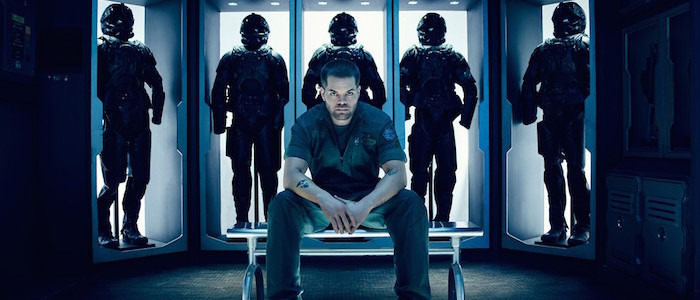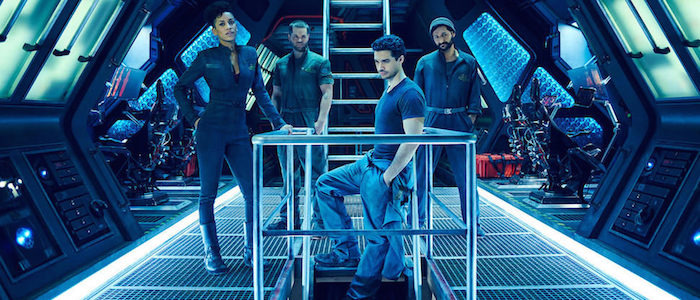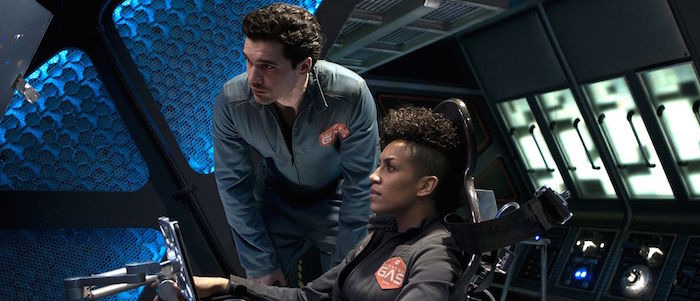The Case For 'The Expanse,' The Cancelled Sci-Fi Show That's Too Good To Die
In December 2015, The Expanse debuted on SYFY and, almost overnight, sparked a loyal and loving fanbase. Based on author James S.A. Corey's (writing team Ty Franck and Daniel Abraham) book series, The Expanse was embraced by fans of the books and viewers who had been looking for a show to love since Battlestar Galactica ended in 2009.
And then, after three seasons, it was cancelled. Far, far too soon.
A Blameless Cancellation
There's no doubt this cancellation is painful and a number of fans are calling SYFY out for the decision, but I honestly don't blame the network. Bottom line: networks need to make money on the shows they air in order to air them and SYFY's deal with production company Alcon Entertainment limited those options.
SYFY only had the rights to first run, linear television airings of The Expanse. In essence, the only way they made money on the show was from people watching live on the network. Considering how many viewers now watch their favorite shows on streaming, via DVR, and digital video, that's a lot of revenue being missed. Personally, I haven't watched a whole lot of live TV recently. How about you?
Not that any of that matters when you hear that one of the best shows on television is suddenly shopping for a new home after its third season. That said, The Expanse could make the jump to another network or find a home with Netflix or Hulu and the fans would surely follow. The big question now is, will they?
A New Home
Personally, I think they'd be foolish not to. The Expanse would fit perfectly amongst other peak TV shows like The Handmaid's Tale on Hulu or Stranger Things on Netflix. There's also the added benefit of either network picking up a fully produced series that comes with a built-in audience. While a television network earns their money on advertising, a subscription model works for a show like The Expanse because, for the most part, there are no additional production costs to take on.
Additionally, it means viewers would have access to previous seasons and The Expanse could continue to build an audience. If you want to watch previous seasons of The Expanse currently, your options all involve some sort of additional cost instead of being folded in with a subscription. Amazon Prime video allows you to watch past seasons, but, again, you have to have Amazon Prime.
If it sounds like I'm negotiating or trying to make a case for why someone, anyone, needs to pick The Expanse up for a fourth season, I am. Because it's worth it. There's a lot of television out there right now and you can even say there's a lot of smart television out there right now. But how much actual science fiction is out there right now? And how much of it is delving into both the science and future aspects without flinching while also working with the idea that hope still matters and that, while people do terrible things, humanity as a whole is still worth saving?
A Future Worth Fighting For
Think about it for a minute. There's a lot of dystopian future stuff out there. There are a lot of futures where humanity's already screwed the pooch and someone's just trying to survive. Hell, 12 Monkeys is one of my favorite shows on television and that's all about trying to fix the past to save the future. The 100? An AI blew up the world and now humanity's just trying to survive. Van Helsing? Vampire apocalypse. Westworld? Do I even have to say it? From the Resident Evil movies to Blade Runner, we have all sorts of examples of the way things in the future have already gone spectacularly sideways.
Not The Expanse.
The Expanse looks at a future that feels both more possible and, in a way, more probable, but it also refuses to move towards the inevitable doom lots of other sci-fi shows and movies have traveled. The future isn't set. The world isn't already screwed. Humanity isn't lost. Not yet.
That's not to say that the outlook is rosy. If you're a fan of The Expanse, you know what I mean. If not, here's the basic rundown of the show.
The Rundown
The Expanse is set roughly 200 years in a future where Earth has colonized both Mars and The Belt (the asteroid belt between the orbits of Mars and Jupiter, including a colonized Ceres) and small outposts have been created on some of Saturn's and Jupiter's moons. As often happens with colonies (hello, America) both Mars and The Belt sought out their own autonomy especially as time went on and generations of both Martians and Belters were born and original colonists died.
When the series starts, the alliance between Earth's United Nations, Mars, and The Belt is strained but holding. We're introduced to players from all sides of that alliance. Most notably, Chrisjen Avasarala, the UN Assistant Undersecretary of Executive Administration, Joe Miller, a detective on Ceres, and the crew of The Rocinante including Earther Jim Holden, Martian pilot Alex Kamal, and Belter Naomi Nagata. Tensions are further strained by a faction within The Belt called the OPA (Outer Planets Alliance) who are willing to use guerilla tactics to gain independence but have also earned real loyalty.
Now toss a biological threat that could change the course of life as humanity knows it, maybe wipe humanity out altogether, into the mix.
In other words, the chess board's been set on a currently active geyser and everyone wants a place at the table. What could possibly go wrong?
Turns out, a lot can and will because The Expanse knows that, no matter the dangers of space or all the tech advancements the future may hold, people are still people. People are mutable, changeable, honorable, mercurial, and so many other things. People thirst for power, long for freedom, fight for change, and just want to survive until tomorrow sometimes.
A Science Fiction Show That Cares About the Science
The Expanse also works because of the science itself. Both Expanse showrunner Naren Shankar and the authors are committed to making the science in The Expanse as true to life as possible. The science behind The Expanse was discussed at The Science and Entertainment Exchange (part of the National Academy of Sciences) while things like the gravity and communications in the show have been explained by NASA.
It's the Coriolis effect on water due to the spin needed to produce gravity on Ceres station; it's the lack of artificial gravity on ships which lead to crew members wearing grav boots at all times; it's the ways bones of those in space would react to Earth's gravity. Plants on the Rocinante aren't there for decoration. They're part of the air recycling system. The list goes on.
Bourbon. Neat. No gravity. #TheExpanse pic.twitter.com/qb8pIZC5G2
— The Expanse (@ExpanseSYFY) December 16, 2015
When you root a show about space and the future of science, the reality you bring to the table makes a difference. The Expanse continues to push for more science fact in their science fiction. Thereby appealing to fans on multiple levels.
The Show We Need Right Now
We're living in a time of tremendous upheaval. Daily, we read about potential threats to our financial future or our food supply. Climate change, governmental overreach, presidential misdeeds...the list goes on. There are people living their lives in fear and others living in a blissful oligarchy while tech companies gather more information and regular citizens see once guaranteed services disappearing. The idea that things could go sideways any minute isn't all that far-fetched for a lot of people out there right now. We have very real divisions between political parties and individual states. Can you imagine the magnification of all of that if we throw in extra planets and a potential alien aspect?
That's what The Expanse does and, while it seems strange to think that people who are already living in upheaval want to watch more upheaval to relax, The Expanse also offers something many people may not be seeing right now – human beings fighting to make things better. Imagine the Earth having someone like Chrisjen Avasarala to bring both heart and hard truth to the table for the human race. Or having people like the crew of The Roci trying to figure out what's really going on and working together as best as they can to fix it.
For story purposes, the crew of The Roci may well be the heart of The Expanse as the crew is a reflection of the overall world and made up of Earthers, Martians, and Belters. They range from OPA loyalist Naomi to the almost unflappable Amos. Holden's the idealist, Alex is the cowboy who's done his time in the MCRN and can't give up flying or the freedom space provides. Bobbie Draper, once a staunch Martian Gunnery Sergeant intent on hating Earthers has found herself smack dab in the middle of a fight to save people she's been taught to hate and the home she loves.
It's these dichotomies and these tensions that make the show so interesting. And it's what gives me hope. For all of the "bad shit" happening in the world of The Expanse, no one's giving up or giving in.
Maybe that's why fans are fighting so hard to find The Expanse a new home. Whether they've read the books or just watch the series. Whether they were in it from the beginning or came to the show late. Whether they love the show for the scientific angle or they root for the love between Miller and Julie Mao. The point is, no one wants to see a show that may provide a view of the future we actually might want to live in die because a network couldn't see the value in the future of a TV show.
There's so much shit going wrong in the world these days. Personally, I'd really like to see someone get this decision right.






